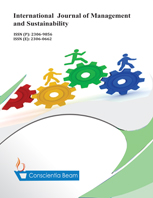Factors affecting GEN Z’s intention to leave jobs in Vietnam
DOI:
https://doi.org/10.18488/11.v13i3.3856Abstract
This study examines the factors affecting Gen Z’s intention to leave jobs in Vietnam. The Gen Z workforce is a fundamental human resource in society. However, the mounting rates of job turnover within this demographic have emerged as a notable cause for concern. This study, based on social exchange theory and self-concept theory, aims to evaluate the impact of various factors on the intention to leave among office employees from Gen Z in Vietnam. The study utilized a mixed-method, combining qualitative research (focus groups with 7 official employees) and quantitative research methods (Cronbach’s Alpha, Exploratory Factor Analysis-EFA, Pearson correlation, and multivariate linear regression). A sample of 385 office employees was surveyed, and data was analyzed using SPSS 26 software. The results revealed that stress at work (SW) positively affects office employees’ intentions to leave jobs. In contrast, some factors such as career advancement (CA), corporate social responsibility (CSR), work environment (WE), ethical leadership (EL), and salary policy (SP) negatively affect official employees’ intention to leave jobs. Drawing on these results, managers can better understand how to mitigate the intention to leave jobs among office employees from Gen Z in Vietnam through adjustments in career advancement, corporate social responsibility, work environment, ethical leadership, and salary policy. The study acknowledged certain limitations and provided avenues for future research.

